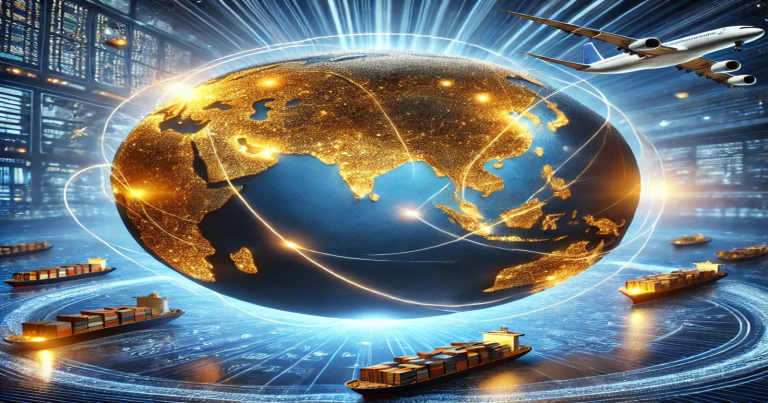International trade is the exchange of goods, services, and capital across national borders. International trade merits and demerits are debated by many in a world that continues to expand because of globalisation. The merits and demerits of international trade are economic growth, job creation, variety of products, and even efficient resource utilisation, economic dependency, trade deficits, environmental degradation, and risk of market monopolies.
International trade has been one of the primary drivers of world economic growth. It makes nations specialise in what they do best and consequently fosters efficiency and innovation. Additionally, international trade can make access to raw materials possible, even if the nation cannot get it from domestic sources. However, increasing reliance on foreign markets may sometimes lead to economic instability and unfair trade practices. International trade is an essential factor in economic development despite its shortcomings. The benefits and drawbacks of international trade allow businesses and governments to make sound judgments regarding their policies on trade and financial plans.
International Business Definition
International business refers to the commercial activities of exchanging goods, services, technology, and capital between two or more countries. It covers imports, exports, foreign direct investments, joint ventures, and multinational corporations conducting businesses across international borders. Companies trade internationally to broaden their market scope, generate additional revenue, and gain access to other resources across the globe.
Globalization, advances in transportation, and trade agreements make international business much more manageable. A company will find a competitive edge, reduce its costs, and explore new customer bases by venturing into global business. Foreign investments and exchange of currencies form part of the financial transactions within international business that affect economies everywhere.
Objectives of International Business
International business aids the countries and businesses in the growth of their economies. The international business objectives differ from maximizing profit to developing diplomacy. The five main objectives include the following:
Market Development
The companies go to international markets to enhance their customer base. Global sales can expand the business with fewer chances of dependence on one market. Some countries are deprived of basic raw materials. International business offers access to raw materials and modern technology that cannot be found locally.
Cost Efficiency
Companies manufacture products in countries where labour and production costs are lower. This helps in reducing expenses and increasing profitability. By operating within several countries, firms avoid economic risks associated with a single region. If one market fails, it can generate more revenue through other markets.
Competitive Advantage
International businesses gain an advantage on global talent, research, and innovation, which puts them ahead of their competitors.
Merits and Demerits of International Trade
International trade has shaped modern economies to a large extent. Countries are able to sell their surplus products, get hold of resources that are not domestically available, and enhance the standard of living of their people. However, the negative consequences of international trade are increased economic dependence, trade deficit, and labor exploitation. Now, we’ll discuss its pros and cons in detail.
| Merits | Demerits |
| Economic growth | Economic dependency |
| Market expansion | Trade deficits |
| Efficient resource use | Loss of domestic industries |
| Cost reduction | Exploitation of labor |
| Innovation | Environmental damage |
| Higher living standards | Political challenges |
| Stronger diplomacy | Income inequality |
Advantages of International Trade
International trade has many benefits to businesses, from the economy to consumers worldwide. It enables economic growth, access to international markets, and innovation. Some of the major advantages of international trade are elaborated further:
Economic Growth and Development
One of the primary benefits of international trade is its contribution to the growth of economic activities. Trade has the effect of generating income through exports for a country, therefore increasing its GDP. Economic activity increases employment opportunities, higher income, and increased living standards. International trade also benefits developing nations by allowing them to industrialize and modernize their economies. By exporting primary products and importing sophisticated machinery, these countries would be able to develop their industries and increase efficiency.
Increased Market
The constraints of domestic markets are their demand, resources, and customers. International trade may open gates to a firm so that it can access much larger markets than national markets. Firms that trade across borders can sell to millions of customers worldwide.
A good example is electronic goods produced by a company in China. This company can export the products to consumers in America, Europe, and Africa. This wider scope of market expansion enables businesses to expand their operation, increase revenue, and build brand presence globally.
Effective Use of Resources
Different countries have different types of natural and human resources. Due to international trade, the countries can specialize in producing the products in which a particular country has comparative advantages. Therefore, they produce the goods on which they are comparatively advantageous, and other stuff is imported that they cannot manufacture properly.
Cost Reduction
In international trade, companies get the opportunity to acquire raw materials and labor from countries where costs are cheaper. Many industries have set up production facilities in countries where labor wages are minimal, taxes are lesser, and economic policies are friendly.
Consumers benefit from international trade, too, because they get imported goods at relatively more affordable prices. Consumers get better purchasing power. Consumers get upgraded living standards.
Innovation and Technology Transfer
With international trade, companies acquire knowledge, skills, and technology. Expanding foreign markets improves locality with technological upgrades and expertise on their respective companies. Thus, companies dealing with foreign partners will attain better machinery, automated equipment, and production methods. This increases the quality, efficiency, and competitiveness in global markets.
Increased Employment Opportunities
International trade expands into new markets; they need more labor to cater to the increased demands of production, hence generating employment.
An automobile company that imports foreign vehicles to Europe would need more workers in its manufacturing plants, logistics departments, and sales teams. Retail chains that import foreign products generate employment in warehousing, transportation, and distribution sectors.
International Relations
Trade facilitates the formation of diplomatic as well as economic relations between states. States that bargain over trade matters frequently have long-term alliances, often reducing the probability of conflict and political tensions. When countries depend on each other for goods and services, they become more prone to maintaining peace and working together on problems like climate change, economic development, and security issues.
Disadvantages of International Trade
Although international trade has numerous advantages, there are also a few disadvantages. Some economies suffer from dependency, trade imbalances, and environmental issues.
Economic Dependency and Vulnerability
Economic dependency is one of the primary disadvantages associated with international trade. If a country depends greatly on exports or imports, it will be vulnerable to economic conditions in foreign economies.
Economic dependence also means loss of control over the country’s economy. Such foreign companies that dominate the local industries may determine market conditions, price levels, and the general employment trend.
Trade Deficits and Balance of Payments Problems
A trade deficit occurs if a country imports more than it exports. This imbalance may lead to a negative balance of payments, increasing the national debt and decreasing foreign exchange reserves. Continuous trade deficits force countries to borrow money to finance their imports.
Loss of Domestic Industries
International companies create cheaper products while providing higher quality when entering a local market. Though this benefits the consumers, it usually hurts the domestic industries that cannot compete. Consequently, most small businesses go out of their way and increase unemployment through economic instability.
Labor exploitation
At times, multinationals have taken advantage of cheap labor in developing countries by very low wages and disregarding their labor rights. The developing countries,workers face poor working conditions, long hours, and lack of job security.
Environmental Degradation and Resource Exploitation
International trade leads to environmental degradation due to overproduction, transportation, and deforestation. Export goods manufacturing industries, in most cases, tend to disregard environmental laws to reduce production costs.
Modes of Entry into International Business
International market entry can be done through various modes. Every mode of entry has its benefits and risks. The table below gives a general overview of the standard modes of entry:
| Mode of Entry | Description | Complexity | Control Over Operations |
| Exporting | Selling goods directly to foreign markets. | Least complex | Low |
| Licensing | Allowing foreign firms to use patents or brand names. | Moderate | Low |
| Franchising | Expanding a business model through franchises. | Moderate | Moderate |
| Joint Ventures | Partnering with foreign firms for business operations. | Moderate to High | Shared |
| Foreign Direct Investment (FDI) | Setting up production units in foreign countries. | High | High |
| Mergers and Acquisitions | Buying or merging with foreign companies. | High | High |
Scope of International Business
International business encompasses all areas, including the economy, employment, and technological change. Trade of Goods & Services Involves importing and exporting products between countries. The boundaries of international business are expanding due to globalisation, which interlinks economies. Organisations must be flexible with various rules, currencies, and customer preferences to excel.
| Scope | Description |
| Trade of Goods & Services | Involves importing and exporting products across nations. |
| Foreign Investments | Includes Foreign Direct Investment (FDI) and portfolio investments. |
| Global Workforce Management | Companies hire employees from multiple countries. |
| Technology Transfer | Countries exchange technological advancements to improve industries. |
| International Marketing | Businesses create global marketing strategies for diverse markets. |
| Multinational Corporations (MNCs) | Large firms operate in multiple countries. |
Functions of International Business
International business aids the exchange of goods and services across national borders. Trade across countries will enable businesses to sell more products in a global market and fulfill broader demand. Companies would have to participate in exports and imports in order to maximize revenue and further enlarge their market.
| Key Area | Aspect | Description | Example |
| Encouraging Foreign Investments | Foreign Direct Investment (FDI) | Companies establish manufacturing plants, subsidiaries, and joint ventures in other countries to increase production and reduce costs. | Toyota setting up factories in the USA. |
| Portfolio Investment | Investors buy foreign stocks, bonds, and financial instruments to diversify investments and share risks. | U.S. investors purchasing shares of Samsung in South Korea. | |
| Improving Technological Transfer | Research & Development (R&D) | Multinational companies set up R&D centers globally to innovate and enhance products and services. | Google’s AI research labs in different countries. |
| Technology Transfer | Knowledge and technology are shared through licensing agreements, joint ventures, and collaborations. | Microsoft licensing software to foreign tech firms. | |
| Industrial Development | Advanced manufacturing techniques and automation introduced by multinational companies boost industrial growth. | Siemens implementing smart manufacturing systems in India. | |
| Telecommunication & IT Expansion | Growth of global communication networks, digital payments, and cybersecurity solutions. | Expansion of 5G networks by Huawei globally. | |
| Promoting Economic Growth | Job Generation | Foreign businesses create employment opportunities by entering new markets. | Amazon’s warehouses providing jobs in Europe. |
| Infrastructure Development | Development of roads, ports, airports, and communication facilities to support international business operations. | Development of ports in Africa funded by foreign companies. | |
| Income Generation | Higher business revenues lead to better wages and improved purchasing power for workers. | Apple’s global supply chain creating high-paying jobs. | |
| Earnings in Foreign Exchange | Export revenues strengthen national economies through foreign currency inflows. | India earning foreign exchange through IT service exports. |
Difference Between Domestic and International Trade
Business activities can be categorized into domestic and international business activities. Domestic business is buying and selling goods and services within one country, whereas international business concerns trading across national borders. Two types of businesses differ greatly with operations, market strategies, legal environments, and risks. Companies planning to go global have much to learn about these differences. Here is a table summarizing key differences
| Basis of Comparison | Domestic Business | International Business |
| Definition | Trade of goods and services within one country. | Trade of goods and services across international borders. |
| Cultural Factors | Minimal cultural differences. | Deals with diverse cultural norms and business practices. |
| Political Risk | Lower political risks. | Higher political risks due to changing international relations. |
| Language Barrier | Generally no language barriers. | Language differences may affect communication. |
| Transportation Costs | Lower due to shorter distances. | Higher due to long-distance shipping and logistics. |
| Market Complexity | Less complex as the market is familiar. | More complex due to different consumer preferences and regulations. |
| Example | A local grocery store operating in one city. | Apple Inc. selling products globally. |
Merits and Demerits Of International Business FAQs
1. What is international trade meaning?
International trade refers to the buying and selling of goods and services crossing international borders. It gives a country access to foreign markets and resources.
2. What is the importance of international trade?
International trade is important because it facilitates economic growth, promotes innovation, boosts living standards, and provides employment opportunities.
3. What are the benefits of international trade?
Advantages of international trade include economic growth, cost savings, availability of resources, newness, and better international relationships.
4. What is the difference between domestic and international business?
Domestic business is within one country while international business cuts across borders for trade and investments.
5. What are the modes of entry into international business?
The modes of entry into international business are exporting, licensing, franchising, joint ventures, FDI, and mergers/acquisitions.


